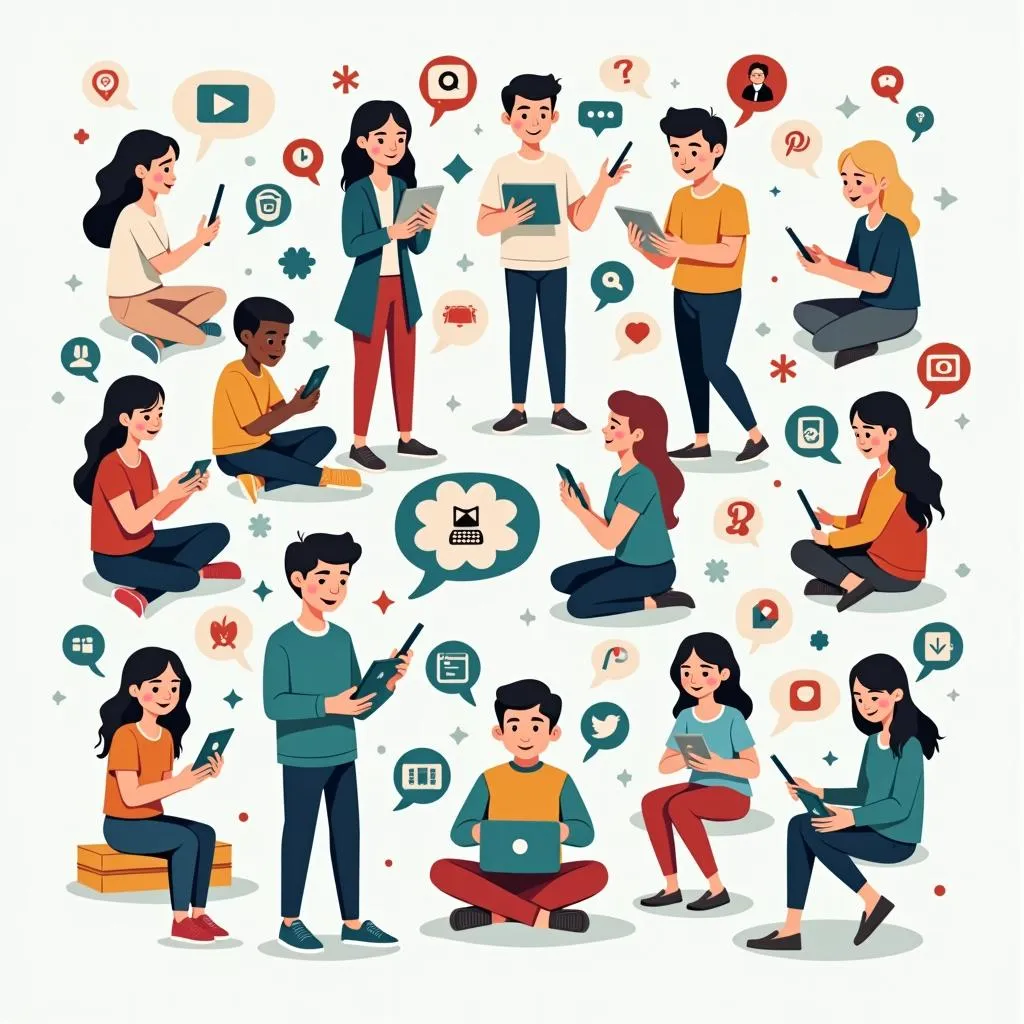Social media’s impact on teenage self-esteem is a highly relevant topic in modern IELTS Writing Task 2 essays. This theme has appeared in various forms over the past few years, reflecting its growing importance in society. Based on recent trends, we can expect this topic to remain prevalent in future IELTS exams. Let’s examine a specific question that has been featured in recent tests:
Some people believe that social media has a negative impact on the self-esteem of teenagers. To what extent do you agree or disagree with this statement?
This question directly addresses the impacts of social media on mental health among teenagers, making it an excellent example to analyze and practice with.
Analyzing the Question
The question asks for your opinion on whether social media negatively affects teenagers’ self-esteem. Key points to consider:
- Focus on teenagers specifically
- Discuss the impact on self-esteem, not general effects
- Consider both positive and negative aspects
- Provide your opinion and justify it with examples and reasoning
Sample Essays
Band 8-9 Essay
In today’s digital age, social media has become an integral part of teenagers’ lives, leading to ongoing debates about its impact on their self-esteem. While some argue that these platforms have detrimental effects, I believe that the influence of social media on teenage self-esteem is more nuanced and can be both positive and negative, depending on various factors.
Undoubtedly, social media can negatively affect teenagers’ self-perception. The constant exposure to carefully curated images of peers and celebrities can create unrealistic standards of beauty, success, and lifestyle. This comparison culture often leads to feelings of inadequacy and low self-worth among young users. Moreover, the pursuit of likes, comments, and followers can tie a teenager’s self-esteem to external validation, making them vulnerable to online criticism and cyberbullying.
However, it would be overly simplistic to label social media as entirely harmful. These platforms also offer opportunities for positive self-expression, identity exploration, and community building. Teenagers can find supportive online communities that share their interests, values, or challenges, fostering a sense of belonging and boosting self-esteem. Additionally, social media can be a powerful tool for self-empowerment, allowing teens to showcase their talents, advocate for causes they believe in, and develop digital literacy skills crucial for their future.
The key to mitigating negative impacts lies in how social media is used and perceived. Education on digital literacy, critical thinking, and healthy online habits is crucial. Parents, educators, and platform developers all have roles to play in creating a safer, more positive online environment. Encouraging teenagers to curate their feeds with diverse, inspiring content and to engage in meaningful interactions rather than passive scrolling can transform their social media experience.
In conclusion, while social media certainly poses risks to teenage self-esteem, its impact is not inherently negative. By fostering a balanced approach to social media use and equipping teenagers with the tools to navigate these platforms wisely, we can harness the positive potential of social media while minimizing its drawbacks. The goal should be to empower teens to use social media as a tool for growth, connection, and self-affirmation, rather than a source of self-doubt.
 Social media's impact on teenage self-esteem
Social media's impact on teenage self-esteem
Band 6-7 Essay
Social media has become a big part of teenagers’ lives today. Many people think it hurts their self-esteem. I partly agree with this idea because social media can have both good and bad effects on how teenagers feel about themselves.
On the negative side, social media can make teenagers feel bad about themselves. They see perfect pictures of their friends and famous people, which can make them think their own lives aren’t good enough. Also, getting likes and comments becomes really important, and if they don’t get many, it can make them feel unpopular or not liked. Cyberbullying is another problem that can really hurt teenagers’ confidence.
But social media isn’t all bad for self-esteem. It can also help teenagers in some ways. They can express themselves creatively through posts and videos, which can make them feel good about their skills. Social media also helps them connect with people who have the same interests, making them feel like they belong to a group. Some teenagers use social media to learn new things or support good causes, which can make them feel proud and confident.
I think whether social media is good or bad for teenagers’ self-esteem depends on how they use it. If they spend too much time comparing themselves to others or worrying about likes, it can be harmful. But if they use it to connect with friends, learn new things, and express themselves, it can be positive.
To make social media better for teenagers’ self-esteem, we need to teach them how to use it in a healthy way. Parents and schools should help teenagers understand that what they see on social media isn’t always real and that their value isn’t based on likes or followers. Teenagers should also be encouraged to do things offline and not rely too much on social media for feeling good about themselves.
In conclusion, while social media can negatively affect teenagers’ self-esteem, it’s not all bad. With the right approach and education, it can be a tool for building confidence and connections. The key is to find a balance and use social media in a way that makes teenagers feel good about themselves.
 Educating teenagers about healthy social media use
Educating teenagers about healthy social media use
Band 5-6 Essay
Social media is very popular with teenagers today. Many people think it is bad for how teenagers feel about themselves. I agree that social media can hurt teenagers’ self-esteem.
First, social media shows many perfect pictures. Teenagers see these and feel bad about their own looks or life. They think they are not good enough. This makes them sad and less confident.
Also, on social media, people want many likes and nice comments. If a teenager doesn’t get these, they feel unpopular. This can make them feel very bad about themselves.
Another problem is bullying online. Some people say mean things on social media. This can really hurt a teenager’s feelings and make them feel worthless.
But sometimes, social media can be good too. Teenagers can make friends and share their ideas. This can make them feel happy and more confident. They can also learn new things on social media.
To help, parents and teachers should teach teenagers about using social media safely. They should tell them that not everything on social media is real. Teenagers should also do other activities, not just use social media all the time.
In conclusion, I think social media is mostly bad for teenagers’ self-esteem. But with help and education, it can be less harmful. We need to teach teenagers how to use social media in a good way.
Explanation of Band Scores
Band 8-9 Essay Explanation
This essay demonstrates excellent writing skills and a sophisticated approach to the topic, warranting a high band score:
- Task Achievement: The essay fully addresses all parts of the task, presenting a well-developed response with relevant, extended ideas.
- Coherence and Cohesion: Ideas are logically organized with clear progression throughout. Paragraphing is skillful and cohesive devices are used effectively.
- Lexical Resource: A wide range of vocabulary is used with very natural and sophisticated control of lexical features. Key terms like “comparison culture” and “digital literacy” are used appropriately.
- Grammatical Range and Accuracy: A wide range of structures is used with full flexibility and accuracy. Complex sentences are handled with skill.
Band 6-7 Essay Explanation
This essay shows a competent handling of the task, though with less sophistication than the Band 8-9 essay:
- Task Achievement: The essay addresses all parts of the task, though some aspects are more fully developed than others.
- Coherence and Cohesion: There is a clear overall progression, but some ideas may be better connected. Basic cohesive devices are used effectively.
- Lexical Resource: An adequate range of vocabulary is used for the task. There are attempts at using less common vocabulary, though sometimes with slight awkwardness.
- Grammatical Range and Accuracy: A mix of simple and complex sentence forms is used. Errors are present but do not impede communication.
Band 5-6 Essay Explanation
This essay demonstrates a modest attempt at addressing the task:
- Task Achievement: The essay addresses the task, but the format is simple, and ideas may be repetitive or underdeveloped.
- Coherence and Cohesion: There is a basic structure, but paragraphing may be inadequate. Cohesive devices are simple and may be overused or inadequate.
- Lexical Resource: A limited range of vocabulary is used, adequate for basic communication but lacking precision for more complex ideas.
- Grammatical Range and Accuracy: Sentence structures are simple and repetitive. Errors are frequent but do not greatly impede communication.
Key Vocabulary
- self-esteem (noun) /ˌself ɪˈstiːm/ – confidence in one’s own worth or abilities
- detrimental (adjective) /ˌdetrɪˈmentl/ – tending to cause harm
- nuanced (adjective) /ˈnjuːɑːnst/ – characterized by subtle shades of meaning or expression
- curate (verb) /kjʊˈreɪt/ – select, organize, and present (online content, merchandise, information, etc.)
- cyberbullying (noun) /ˈsaɪbəˌbʊliɪŋ/ – the use of electronic communication to bully a person
- digital literacy (noun phrase) /ˈdɪdʒɪtl ˈlɪtərəsi/ – the ability to use information and communication technologies
- self-perception (noun) /ˌself pəˈsepʃn/ – the idea one has of one’s abilities, appearance, and personality
- validation (noun) /ˌvælɪˈdeɪʃn/ – recognition or affirmation that a person or their feelings or opinions are valid or worthwhile
- mitigate (verb) /ˈmɪtɪɡeɪt/ – make less severe, serious, or painful
- empower (verb) /ɪmˈpaʊə(r)/ – make (someone) stronger and more confident, especially in controlling their life and claiming their rights
These essays demonstrate how the impact of social media on teenage self-esteem can be discussed at different levels of proficiency. When practicing, focus on developing your ideas fully, using a range of vocabulary and grammatical structures, and organizing your thoughts coherently.
Conclusion
The topic of social media’s impact on teenage self-esteem is likely to remain relevant in IELTS Writing Task 2. Future questions might explore related themes such as:
- The role of parents in managing teenagers’ social media use
- Comparing the effects of social media on different age groups
- The responsibility of social media companies in protecting young users’ mental health
- The long-term consequences of social media use on personal development
To prepare effectively, practice writing essays on these topics, focusing on developing balanced arguments and using specific examples to support your points. Remember to engage critically with the prompt, considering multiple perspectives before forming your own opinion.
We encourage you to write your own essay on this topic and share it in the comments section below. This practice will help you refine your writing skills and gain valuable feedback from others preparing for the IELTS exam.
 The broader impact of social media on youth culture
The broader impact of social media on youth culture
As you continue to explore how social media influences mental health in adolescents, remember that a well-rounded understanding of this topic will not only benefit your IELTS performance but also contribute to your awareness of an important societal issue. Keep practicing, and good luck with your IELTS preparation!


